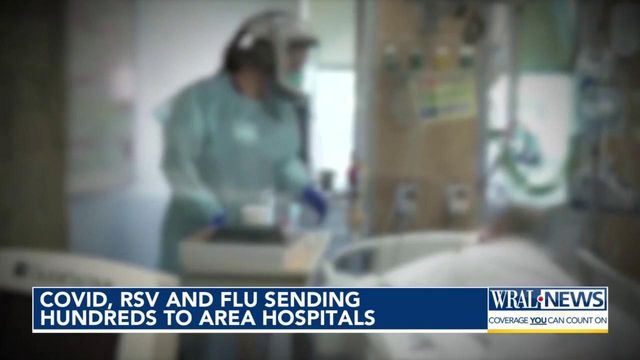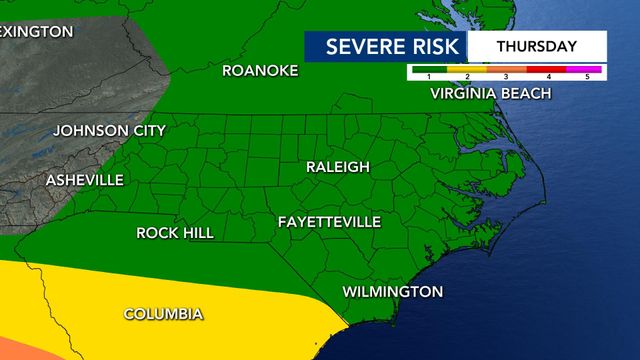State to release new flu, COVID & RSV numbers Wednesday as cases climb
New visitor restrictions are now in place at Duke, UNC and WakeMed hospitals across the Triangle.
The state will release new COVID, flu and RSV numbers Wednesday morning.
Between flu, COVID and RSV cases, area hospitals are experiencing a busy start to the new year. Hundreds of patients have sought treatment at Duke Health, UNC Health and WakeMed in recent weeks due to all three respiratory illnesses.
Duke Health saw a 112% spike in flu cases across its hospital systems – from 34 flu patients to 72. That’s just in the past two weeks.
In the same time period, Duke saw COVID-19 cases rise by 8%, to 41 patients, and RSV cases decrease by 17%, to 25 patients.
Between Dec. 26 and Jan. 1, UNC Health’s biggest increase was in COVID-19 cases. The hospital system reported a 73% increase from 22 patients to 38 patients.
Within the last week, UNC Health also saw a 50% increase in RSV cases from 20 patients to 30. Meanwhile, flu cases were down 3% with 33 patients as of Jan. 1.
The latest data from WakeMed shows 31 people hospitalized with COVID-19, 22 with the flu and 11 people admitted with RSV.
Overall, WakeMed saw 311 positive COVID-19 tests, 523 positive flu tests and 108 positive RSV tests in the period between Dec. 28 and Jan. 1.
Duke Health Infectious Disease Specialist Dr. Cameron Wolfe says this increase was expected because of the holidays.
Since it typically takes people a few days to feel sick after being infected with all three respiratory viruses, one area doctor says hospitals will likely continue to see high case numbers for the next few weeks.
"Unfortunately, it has not yet hit is peak, I don’t think, at least here in the Triangle," Dr. Wolfe said.
With kids headed back to school and adults headed back to work, Wolfe said he hopes people stay mindful of their own symptoms and aware the viruses are spreading all around them.
Dr. Wolfe says pay attention to see if your kids are displaying any cold or flu-like symptoms. He says if you notice any symptoms, consider keeping them at home.
"Kids are not very good necessarily, especially elementary school and primary school-aged kids, about telling about their symptoms. So be prepared to be observant about how your how your son and daughter is symptomatically feeling," he said.
If your child is routinely wiping their nose, Wolfe said that is a good indicator they should stay home from class to mitigate the spread of various illnesses.
“This is a time when classically schools are little incubators for all sorts of germs, and I think we can generally do a little bit better than we often do. And I say that as a dad to elementary school-aged kids. I get it; it's not straightforward. But, we've all got that responsibility to each other,” said Wolfe.
Wolfe also said young adults should be mindful of spending time around older loved ones after being in large crowds on New Year’s Eve.
“Who goes out on New Year’s Eve? It’s not your 85-year-old generally, it’s often your 25-year-old grandson. Then it’s the secondary cases that spill off from that individual that actually don’t come into the healthcare system for perhaps a couple of weeks down the road,” he explained.
To help slow the spread of the big three viruses, all three hospital systems have now implemented new visitor restrictions.









